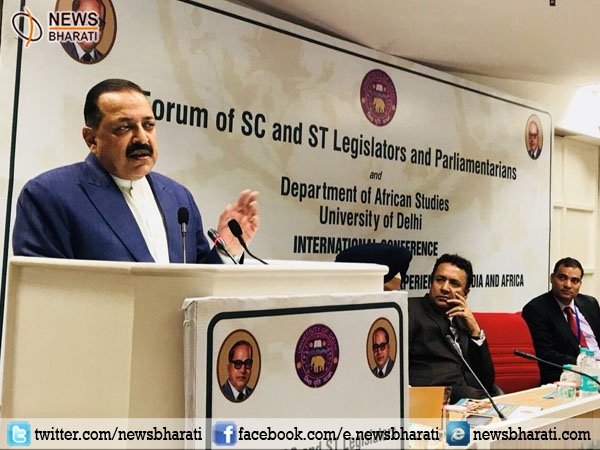International Conference of ‘Inclusive Tribal Congregation’ prioritizes equitable growth of weaker sections
New Delhi, February 23: “Inclusive growth is inherent to the rise of New India”, said Union Minister for Development of North Eastern Region (DoNER) while addressing the Plenary Session of the International Conference of "Inclusive Tribal Congregation.

Addressing the session, Dr Jitendra Singh said the Prime Minister Narendra Modi's dream of "New India" is inspired by the equitable growth of each section of society, regardless of the socio-economic background. The government has envisaged for itself the objective of empowering the poor to enable them to eradicate their own poverty, he added.
In the global world today, where distances and time - gaps have tremendously narrowed down, Dr Jitendra Singh said, "Inclusiveness" is the only option available to move forward. The government is inspired by the ideology of "inclusiveness" which was postulated half a century ago by Pt. Deen Dayal Upadhyay, who defined the concept of "Antyoday", he added.
PM Narendra Modi's economic reforms are not mere economic reforms but also social and behavioural reforms with a long-term impact said Dr Jitendra Singh.
Dr Jitendra Singh said a series of innovative new programmes initiated by the Central Government in the last three years have been inspired by the idea of making every section of society a part of India's growth story and the most striking example of this are schemes like "Jan Dhan Yojana", "PM Krishi Vikas Yojana", etc. Similarly, this approach of "inclusiveness", he said, has been seriously conscious of the fact that over 70% of the population of India today is below the age of 40 years and schemes like "Start-up India, Stand-up India" or "Mudra Yojana" are meant to ensure their "inclusiveness".
As for the tribes, Dr Jitendra Singh said, the best example is offered by Northeast, where we have more than 200 tribes but many members of the tribal communities have excelled themselves in their respective fields of activity and have today emerged as role models for other communities and so-called mainstreams of society. This has also been partly possible, he said, because of modern technology and hi-tech means of easy access to information and easy connectivity with peers across the world.